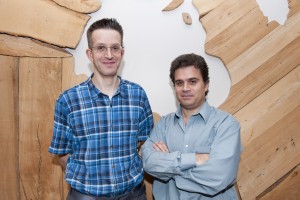WaveCheck to Transform Chemotherapy Monitoring for Women with Breast Cancer
Indiegogo campaign to raise funds for North American clinical study during Breast Cancer Awareness Month; 12 artists donate 13 original works worth over $15,000 to support campaign
Toronto, Canada (October 9, 2013) — WaveCheck — a painless, non-surgical clinical technique developed by a Sunnybrook Health Sciences Centre oncologist and a Ryerson University physicist and supported by MaRS Innovation — is poised to transform chemotherapy response monitoring for women with breast cancer.

WaveCheck combines traditional ultrasound with new software to detect responses to chemotherapy in breast cancer tissues. By making better, more accurate information available about a woman’s response to her chemotherapy treatment in weeks rather than months, WaveCheck creates greater transparency through dialogue between a women and her doctors, empowering her to participate in discussions about whether a given chemotherapy treatment is effective.
Contribute to WaveCheck‘s Indiegogo campaign and help make this technology available to all women with breast cancer faster.
Media coverage: CTV News Channel, the Globe and Mail and Canadian Healthcare Technology have covered WaveCheck’s campaign.
Developed by Dr. Gregory Czarnota, chief of Radiation Oncology at Sunnybrook’s Odette Cancer Centre, and Michael C. Kolios, professor of Physics and Canada Research Chair in Biomedical Applications of Ultrasound at Ryerson, WaveCheck has been used in clinical studies with nearly 100 women receiving upfront, neoadjuvant chemotherapy to treat locally-advanced breast cancer. These results are published in two leading journals, Clinical Cancer Research and Translational Oncology.
In the Indiegogo campaign video, Czarnota, Kolios and three of the 100 women who participated in the first Sunnybrook study explain WaveCheck’s impact.
“The hard truth for women with breast cancer is that 60 to 70 per cent of chemotherapy treatments fail,” said Czarnota, who is also a senior scientist and director of cancer research at Sunnybrook Research Institute and assistant professor in the University of Toronto’s Departments of Radiation Oncology and Medical Biophysics within the Faculty of Medicine. “The 1.5 million women worldwide who will be diagnosed with breast cancer this year need to know that their chemotherapy is working as soon as possible. But this kind of treatment monitoring doesn’t currently exist in standard clinical practice. Instead, a woman’s tumour response is evaluated after she completes her chemotherapy treatment, which is typically a four- to six-month process.






